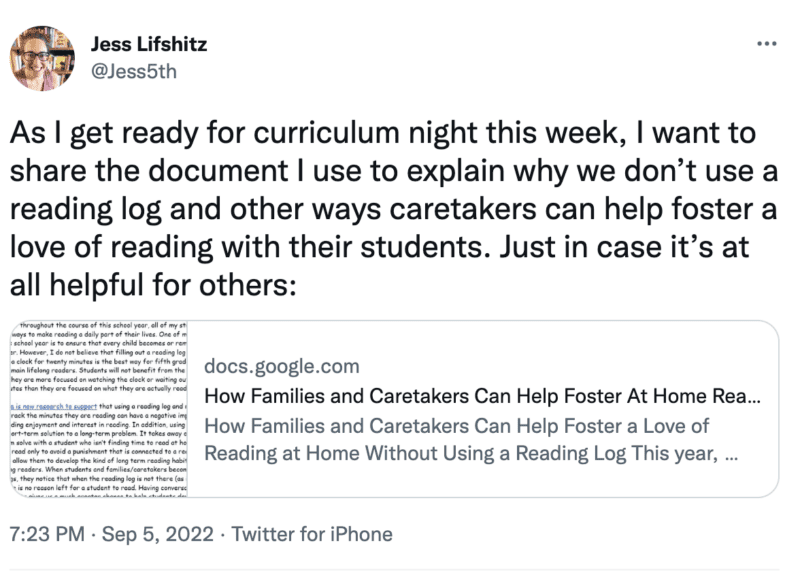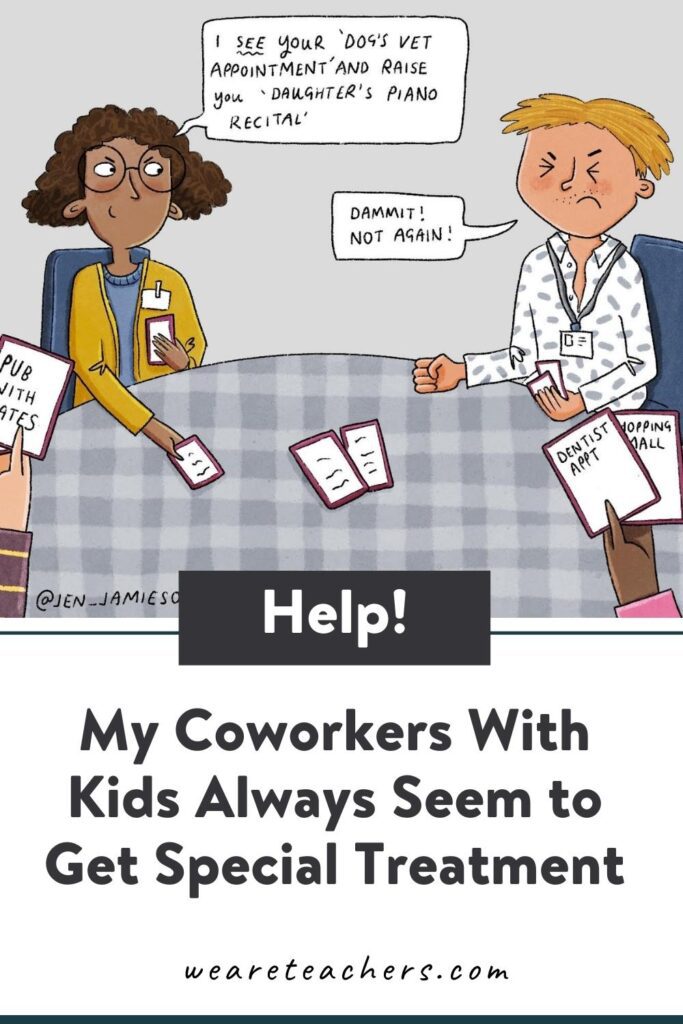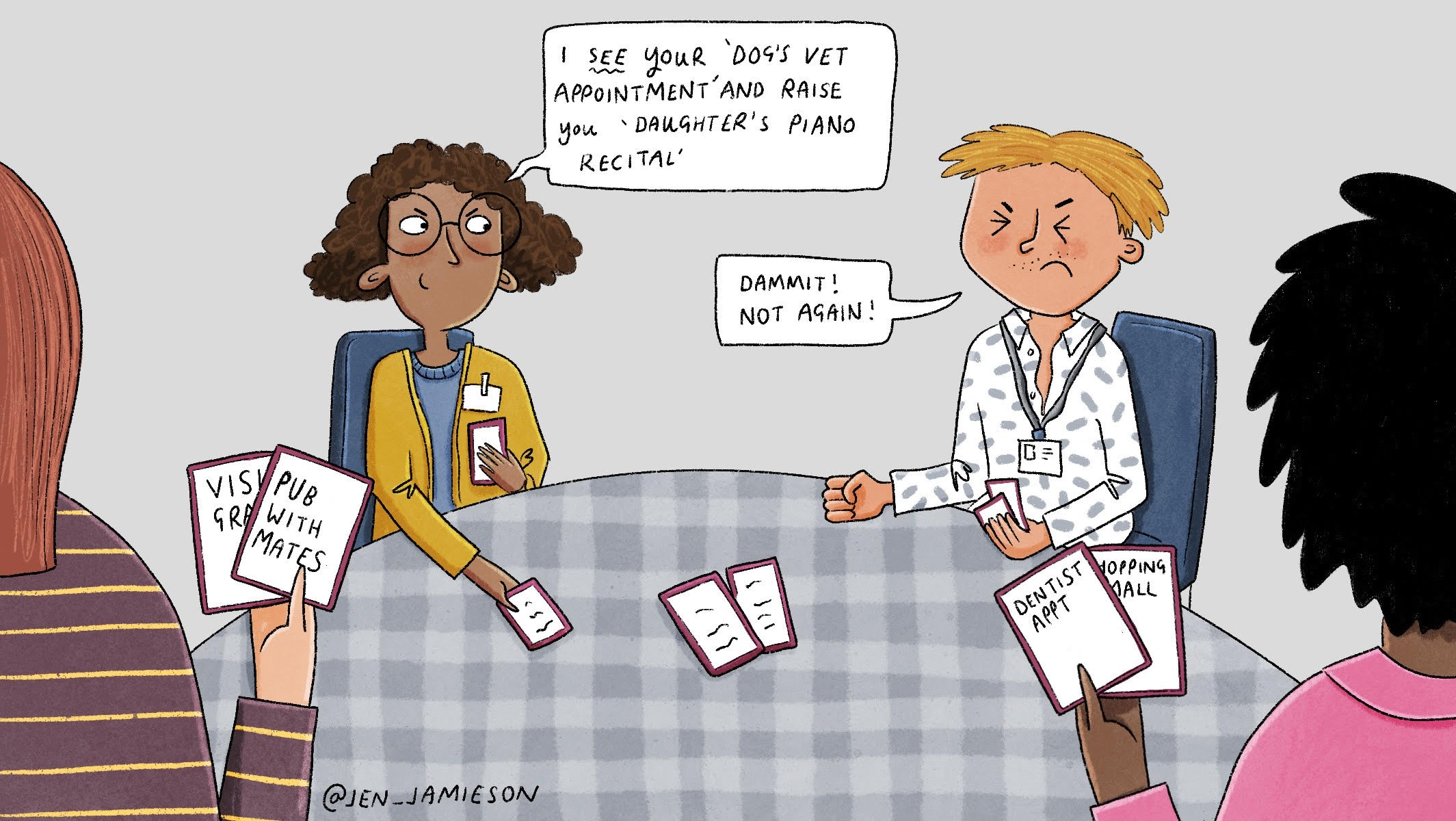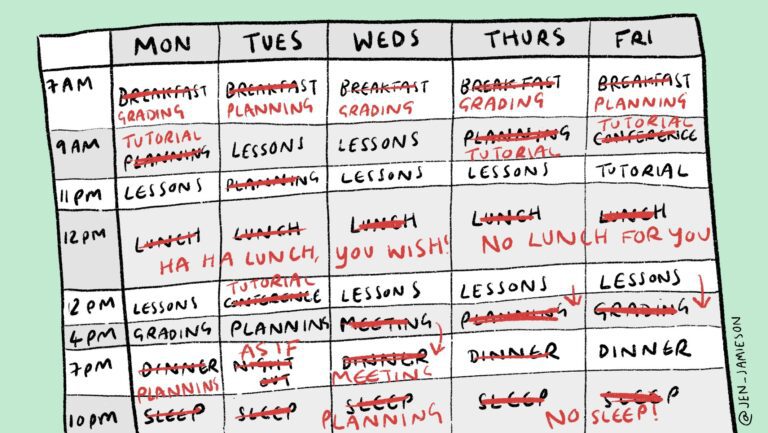Dear WeAreTeachers:
I really love working at my school, except for one issue. Teachers who have children are excused from having to do morning or afternoon duty … ever! Here’s how it works: The options for duty are lunch, recess, A.M. car pickup, and P.M. car pickup. Our administration “randomly” assigns duty positions at the beginning of the year. But somehow, the teachers with children magically have lunch or recess duty both semesters, while teachers without children will have at least one A.M./P.M. duty, or sometimes both. Other teachers have brought this up before but are met with “This is the way we’ve always done it.” But this just seems super unfair and like borderline discrimination. Am I overreacting? —My Dog Matters Too
Dear M.D.M.T,
Just pretend you had a baby! Send out invites to a baby shower and ask for cash donations. You’re welcome in advance.
Just kidding.
I’ve been a teacher before and after having a kid, and you’re right to be frustrated. While family time is important and childcare hours can be tricky, every teacher at your school signed the same “other duties as assigned” contract. Of course there are special circumstances, but those should be dealt with on a case-by-case basis.
The message your school is sending, intentional or not, is that the only people whose time is worth protecting is that of teachers with children. That’s not OK.
If other teachers have brought this up before unsuccessfully in individual conversations, I recommend presenting your argument via email first so that a record of it is in writing. Always acknowledge good intentions first before diving into a spicy topic. For example:
“I’ve noticed that the teachers who have children aren’t assigned morning or afternoon duty. While I know all teachers at [school name] have duty assignments, the A.M./P.M. spots add a significant amount of time to the workday. I know you value the commitments and activities that all teachers at [school name] have outside of school. If we split A.M./P.M. duties evenly, the duty time itself could be shorter, making it easier for everyone to buy in. Could we meet to talk about some solutions?”
Dear WeAreTeachers:
I have a student teacher this year, and I’m really struggling with her lack of initiative. I see this at the classroom level, where she trails behind me asking what to do next. I see it at the planning level too, where she asks for approval at every single step of a task. Once, when she was making a worksheet, she stopped after every question and asked me to approve them one at a time (there were 25!). I’ve talked to her before about how teaching is largely risk-taking and demands a lot of initiative, but with no improvement. I’m exhausted—what do I do? —Where’s My Babysitting Money?
Dear W.M.B.M.,
Oh boy. The student teacher/supervisor relationship can be tough. On one hand, you’re there to help create a teacher who can be successful on their own, which requires honest criticism. On the other hand, you can feel pulled to overlook wrongs because this is a person with whom you have to work closely. And on another hand (I guess we have three hands now), you still need to ensure you’re getting your own work done and that your students have what they need. Finding a balance can be tricky.
It sounds like you tried talking with her about how to improve in a general sense. To me, it seems like she needs clearer, quantifiable markers about what risk-taking and taking initiative really look like. You can do this by:
- Giving her checklists of things you do as a teacher when students are working and when you have downtime. This way she has a go-to set of tasks instead of asking you constantly.
- Asking her to limit worksheet feedback to a single round of edits that you can check all at once.
- Rotate in a daily task or skill you want her to be working on. The skill could be redirecting students, checking for understanding, or even connecting with students. Tell her in advance what you’ll be looking for so she’ll have a way to focus her energy and attention (and you have a focused area for feedback for her).
For many teachers, it can feel way harder to give adults critical feedback than kids. If this is the case, remind her of the overall objective here. “My job as your mentor teacher is to help you develop into the strongest teacher you can be. Right now I’m doing a lot of guiding, and that’s totally fine at the beginning. Eventually, though, we have to start removing those supports to give you ample practice for teaching on your own. Let’s talk about what that might look like in the next few weeks.”
If that doesn’t work or if she doesn’t respect the boundaries you’ve given her, it’s fair to have a chat about the improvement that needs to happen before you can give a passing evaluation to her professor or program.
Dear WeAreTeachers:
I’m a new first grade teacher this year on a team with longtime veteran teachers. While I’m grateful for their expertise on a lot of things, I’m really struggling with the grade-wide expectation to use reading logs. Everything in my literacy training said reading logs are not only ineffective for improving literacy, but they can ruin the goal we all have of creating lifelong readers. I tried just quietly not using them, but our team lead found out. She regularly asks me questions about the reading logs now, and it feels like I’m under the microscope. How do I bow out of this strategy that I know is bad for kids without making my team feel like I don’t value their insight? —Don’t Kill the Reading Log Messenger
Dear D.K.T.R.L.M.,
Being expected to do something that you know isn’t supported by research is tough and frustrating. Looks like you already tried my go-to response for low-stakes issues, which is nod in the meeting and then quietly go do your own thing.
But in this case, your coworkers are checking on your compliance. Plus, the strategy they’re using could be doing some damage to their students’ love of reading. My guess is that they’re not trying to lord over you for no reason (who has that kind of time?). More likely, they probably just have outdated information about reading logs.
You’re going to have to talk with your coworkers honestly. The language used to break away from an established norm can feel tricky, but luckily for all of us, educator Jess Lifshitz (one of my favorite Twitter follows on literacy and a whole host of other topics) has this covered for us:

The Google Doc links to research and provides fantastic ways to support reading outside of school. You can use her resource in shaping your communication to parents and your coworkers.
“I know we share the goal of helping our first graders become lifelong readers. I’m concerned that reading logs hurt our ability to achieve that goal. I don’t plan to use reading logs this year, but I will provide families with strategies to support reading at home. I have several articles on reading log research as well as the language I plan to use with families about supporting literacy—let me know if I can share either of these with you.”
Depending on how married your coworkers are to the institution of reading logs, it may get worse before it gets better. But remember: You have research on your side. It’s worth holding your ground on this one to not kill the love of reading for kids.
Do you have a burning question? Email us at askweareteachers@weareteachers.com.
Dear WeAreTeachers:
This is my third year teaching middle school science. At our back-to-school meeting this year, we found out that our planning/conference periods were being taken to be used as rotating tutorial time. That was tough to hear, but at least we had our lunchtime, right? Wrong! Now our lunchtime will be used for students who need further intervention. Our principal justified this by claiming that she knew none of us would be willing to hold tutorials before or after school, so this was her way of making sure kids get what they needed. Can she do this? —Hangry in Hackensack


